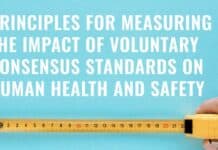The U.S. Environmental Protection Agency (EPA) has released its Recommendations of Specifications, Standards, and Ecolabels for Federal Purchasing, which include four sustainability standards developed by global public health organization NSF International. The recommendations are meant to help federal purchasers identify and procure environmentally sustainable products and services to meet the goals of Executive Order (EO) 13693, Planning for Federal Sustainability in the Next Decade. These latest recommendations focus on facility interiors categories — carpet, flooring, and furnishings.
The EPA’s recommendations are based on an independent assessment of private sector environmental performance standards and ecolabels compared against the EPA guidelines for environmental performance standards and ecolabels.
The recommendations include the following standards developed or co-developed by NSF International:
- NSF/ANSI 140: Sustainability Assessment for Carpet
- NSF/ANSI 332: Sustainability Assessment for Resilient Floor Coverings
- NSF/ANSI 336: Sustainability Assessment for Commercial Furnishings Fabric
- ANSI/BIFMA e3-2010 Furniture Sustainability Standard, a standard co-written with the Business and Institutional Furniture Manufacturers Association
The final recommendations provide a process for decision-making that favors products certified to multi-attribute, life-cycle based sustainability standards. If products certified to these multi-attribute standards are not available, then acceptable single-attribute standards are recommended.
The NSF/ANSI standards included in the recommendations are American National Standards facilitated by the NSF National Center for Sustainability Standards (NCSS) using the American National Standards Institute (ANSI) stakeholder consensus process. This method encourages participation from industry, academia, government, purchasers, and other interested parties and helps ensure a broad range of stakeholder interests are represented in the standards development process.
The NSF standards are point-based and provide a ranking of product criteria achievement (conformant, silver, gold, platinum). The BIFMA e3 Standard awards points to attain level® 1, 2 or 3 certification, with level® 3 being the highest achievement. Categories of criteria vary by standard, but generally cover materials, manufacturing processes (inputs and outputs), a company’s social accountability or governance policies, and end-of-product-life management. These multi-attribute criteria covering the lifecycle of a product make the standards robust in measuring the sustainability attributes of a product and the sustainability intent of the manufacturing organization.



















![[VIDEO] Collect Asset Data at the Speed of Walking a Building](https://facilityexecutive.com/wp-content/uploads/2024/02/maxresdefault-324x160.jpg)